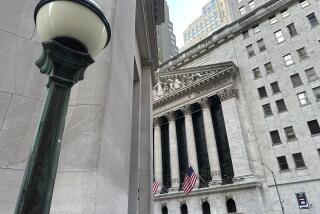U.S. Stocks Slide; Japan’s Bond Yields Rocket
U.S. stocks ended broadly lower Tuesday as long-term bond yields continued to resurge, reflecting the strong economy.
In other markets, Japanese government bond yields also soared anew, sending the dollar down sharply against the yen.
On Wall Street, the Dow Jones industrials lost 71.58 points, or 0.8%, closing at 9,274.12, though the index recovered from a drop of 147 points.
Technology stocks, which have been rocketing for months with few breaks, saw some profit-taking Tuesday. The tech-heavy Nasdaq composite index fell 1.9% to 2,463.42 after reaching a record high Monday.
Losers topped winners by 26 to 15 on Nasdaq and by 19 to 11 on the New York Stock Exchange, in active trading.
The bond market caused some unease in the equity market, as long-term yields jumped for a second straight session.
Rising yields stem in part from the recent stream of data suggesting that the U.S. economy remains robust. That is reducing the likelihood that the Federal Reserve--which began a two-day policy meeting Tuesday--will lower interest rates again any time soon.
Indeed, continued strength in the economy could tilt the Fed toward raising rates later this year, some experts warn. “People are starting to conclude that the Fed is not a friendly force,” said Bill Meehan, chief market analyst at New York-based investment firm Cantor Fitzgerald.
The 30-year Treasury bond yield ended at 5.24%, up from 5.18% on Monday and the highest since Jan. 11. Shorter-term yields also rose.
U.S. bonds also were pressured by rising yields in Japan, which triggered a big rally in the yen. It soared to 112.05 per dollar from 115.08 on Monday.
The yield on the benchmark 10-year Japanese government bond rocketed to an 18-month high of 2.3%, from 2.03% on Monday, after Eisuke Sakakibara, vice finance minister for international affairs, said Japan’s financial crisis will be over “in a couple week’s time.”
Also, Finance Minister Kiichi Miyazawa said he was satisfied with a recent surge in long-term interest rates, indicating the government saw no need to intervene.
Japanese “officials are trying to coax the market into believing the economy is going to recover,” said Jeremy Fand, a currency strategist at BankBoston.
Fand said Sakakibara’s comments suggest officials there might make an announcement soon on the economic outlook, prompting investors to hold yen.
But the yen’s gain didn’t help Japanese stocks: Tokyo’s Nikkei-225 index fell 0.8% to 14,349.
Among Tuesday’s highlights:
* Leading tech stocks pulled back, with Microsoft down $5.31 to $167.63, IBM off $3 to $176.75, Intel down $3.25 to $134.63 and Applied Materials off $3 to $59.19.
Investors are “taking a segment of the market that has had a great run and putting a lid on it,” said Robert Froehlich, strategist at Scudder Kemper Investments.
Still, a Goldman Sachs index of computer hardware makers is up 17.3% so far this year, contrasted with the Dow index’s 1% rise.
* Among other tech giants, Cisco Systems fell $2.61 to $112.39. After the market closed, Cisco reported fiscal second-quarter earnings of 36 cents a share, beating expectations by a penny.
Software leader Oracle eased 31 cents to $58.81. On Monday, it announced a 3-for-2 stock split.
* Smaller stocks fell more sharply than blue chips, worsening the performance disparity between the two market sectors. The Standard & Poor’s small-cap stock index fell 1.5%, versus a 0.9% drop in the blue-chip S&P; 500.
So far this year, the small-cap index is down 3% whereas the S&P; 500 is up 2.8%. A strong economy usually is bullish for smaller companies, but that isn’t translating into stock-price gains for many so far this year.
* The Internet sector suffered mild profit-taking. America Online fell $3.69 to $167.50, Amazon.com dropped $5.63 to $110.25, and Broadcom fell $5.25 to $128.75.
Analysts noted that despite a rally last week, many Net stocks remain far below their peaks reached in mid-January.
Amazon, for example, is off 45% from its peak of $199.13. Broadcom is off 33% from its peak of $191.25.
* Medtronic jumped $4 to $85. The world’s largest pacemaker firm said it received approval to sell its new defibrillator in the U.S. earlier than expected.
* Defense stocks showed strength, reacting to President Clinton’s proposal for higher defense spending. Northrop Grumman gained $1.63 to $64.25; Lockheed Martin added 88 cents to $37.88.
Market Roundup, C9
More to Read
Inside the business of entertainment
The Wide Shot brings you news, analysis and insights on everything from streaming wars to production — and what it all means for the future.
You may occasionally receive promotional content from the Los Angeles Times.










